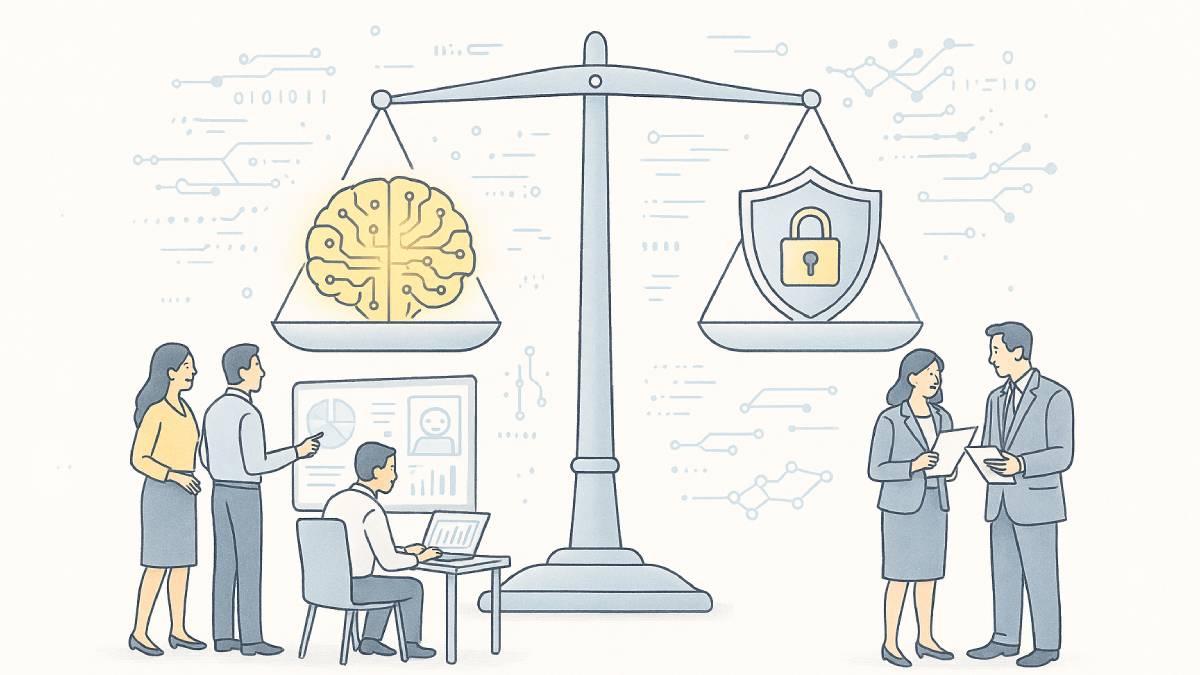‘How responsibly banks use AI will be the decisive factor going forward.’

Kindly note that this illustration generated using ChatGPT has only been posted for representational purposes.
The return on investment (RoI) from technologies such as artificial intelligence (AI) will take time to materialise, and the immediate priority should be to increase spending on building governance frameworks around AI, top bank executives said at the Business Standard BFSI Insight Summit 2025.
At present, there is scope to use AI and automation across areas such as customer service, underwriting, and debt recovery to improve the efficiency of banking operations.
At the same time, executives emphasised that data and AI usage must have valid grounds, with explainability at the core of every application.
The remarks came during a panel discussion titled ‘Impact of Tech & AI on Retail Banking — Pros & Cons’ in Mumbai, moderated by Nivedita Mookerji of Business Standard.
“RoI is case by case. It’s about the overall philosophy of transformative power — whether it’s AI, generative AI, or any tech initiative we bring in,” said Arvind Vohra, group head, retail assets, rural banking business and microfinance, HDFC Bank.
Executives agreed that governance frameworks around AI should be a key focus area, calling for further investment to build ethical and responsible standards.
“Delivering strong returns (RoI) is one part of it, but investing in technology to ensure governance is right is equally critical.
“It requires substantial investment in building the right data culture,” said Ambuj Chandna, managing director (MD) and head of consumer banking, DBS Bank India.
The acceleration of governance standards, they said, would depend on frameworks that ensure explainability and consistency of AI models.
“The Reserve Bank of India is very clear on this — what you cannot explain, you cannot use.
“It cannot be a black box. It must demonstrate predictability and consistency, and you must be able to explain what it’s doing.
“Otherwise, it could lead to major losses or reputational risks for the institution,” said Sachin Seth, regional MD, India and South Asia, CRIF.
Executives observed that appropriate governance frameworks would help build trust across the ecosystem — crucial since customer trust remains the cornerstone of the Indian banking ecosystem.
“Customer service is where a bank’s trust begins.
“Unless we get that right, technology alone won’t help win the customer’s confidence.
“How responsibly banks use AI will be the decisive factor going forward,” said Virat Diwanji, national head — consumer banking, Federal Bank.
AI-led technologies are also expected to accelerate the synthesis of data available within banks.
“The data currently available with banks is structured but exists in silos.
“With technology and AI, there will be a unification and cleaning of this data, which will make these technologies far more efficient,” said Sanjay Mudaliar, executive director, Bank of Baroda.
The panellists also stressed that reskilling will be crucial to ensuring the workforce remains employable as new technologies continue to disrupt the sector.
The banking industry has evolved from the dawn of the internet to the AI era, and each phase has created new jobs to sustain employability, they said.
“We’ve had the internet, mobile banking, ATMs, and core banking systems coming in.
“Jobs don’t really vanish — they evolve, and new ones are created,” added Seth of CRIF.
Among AI use cases, customer service remains the key focus area.
“All our call centres are powered by AI-based transcribers.
“Every call is transcribed in real time, and a quality check is done to determine whether it’s a regular call or a complaint — and what the nature of that complaint is,” said Chandna of DBS Bank India.
He added that the transcripts are then mined for insights to improve products and policies.
Feature Presentation: Ashish Narsale/Rediff




